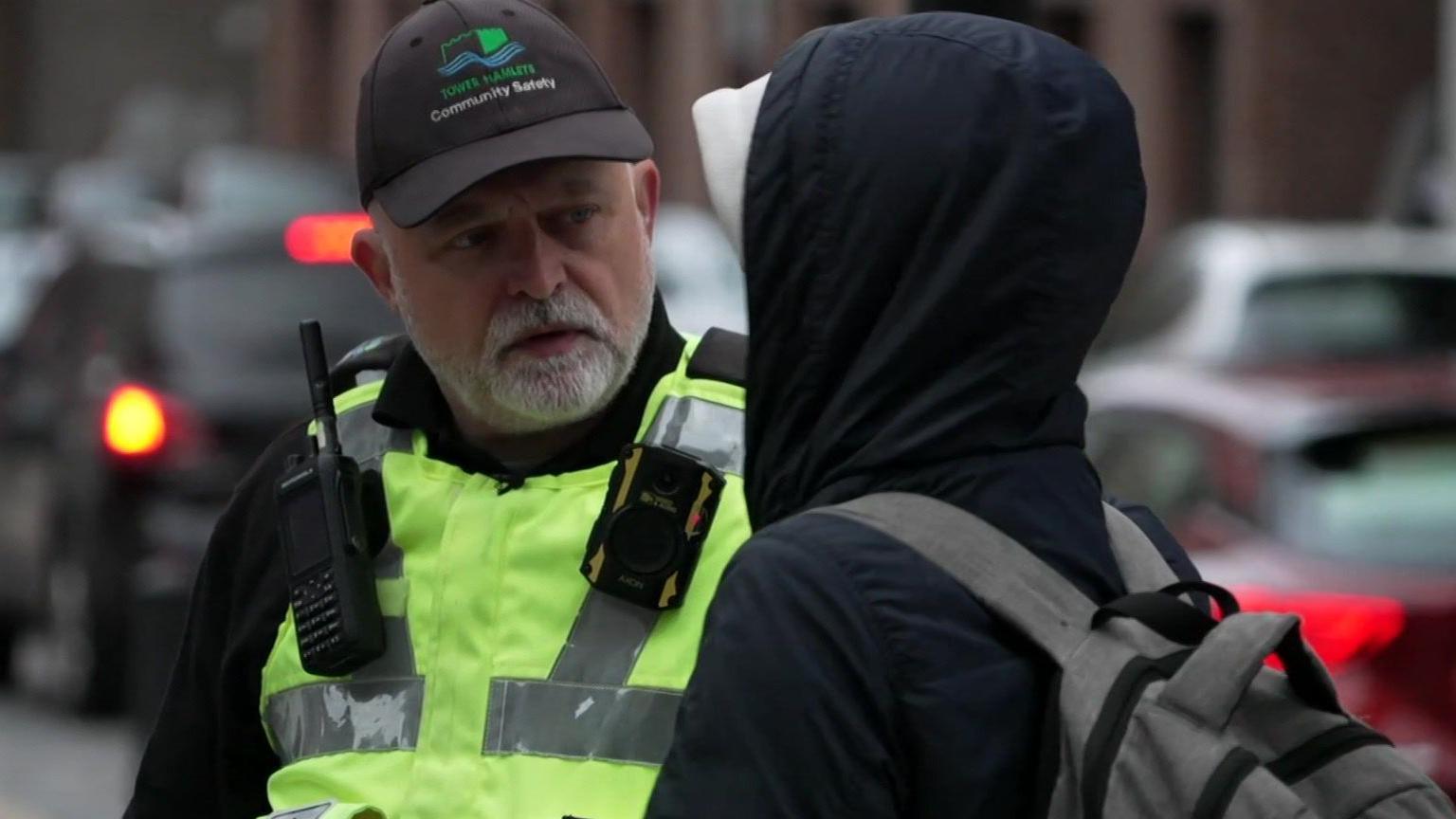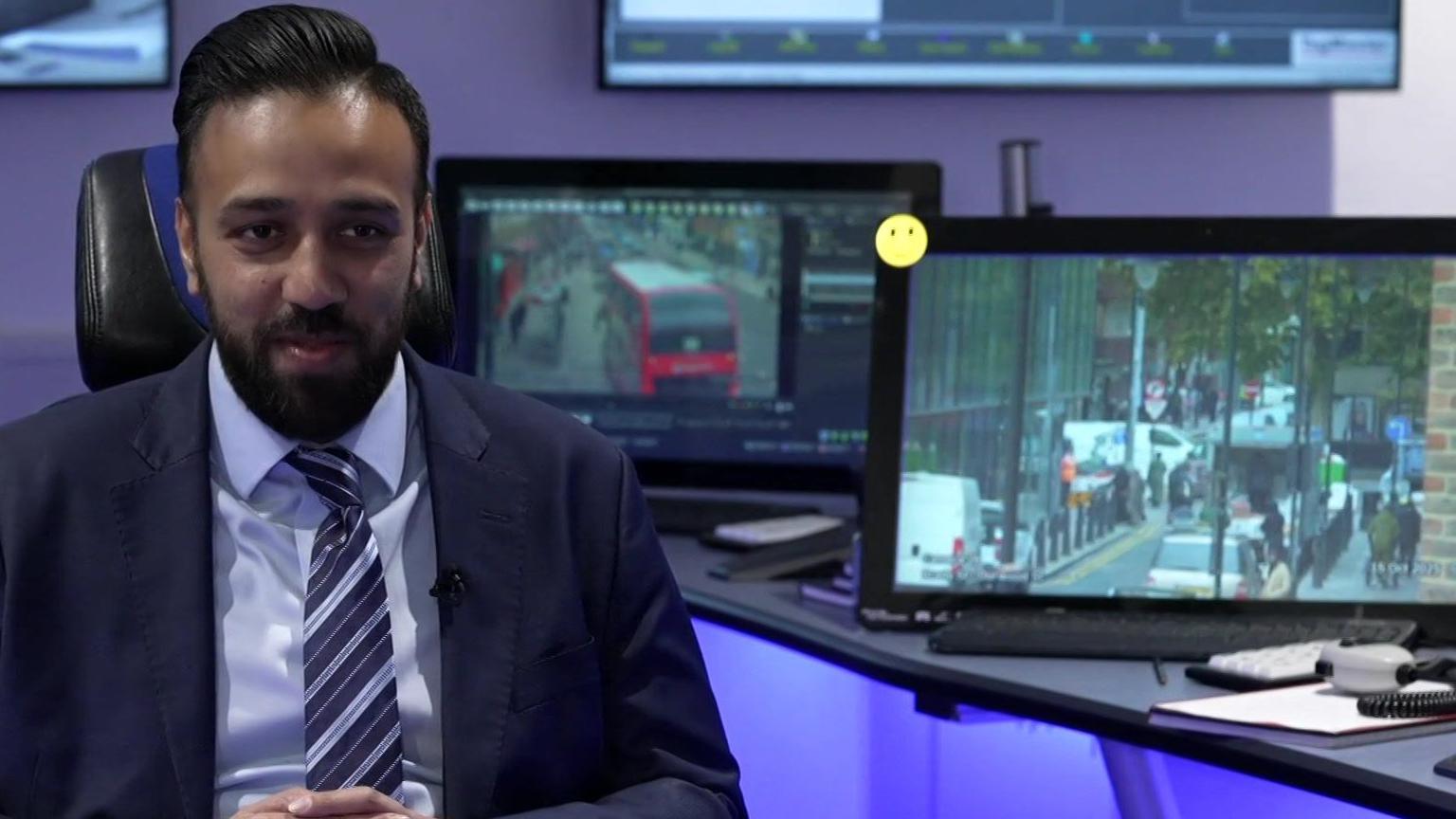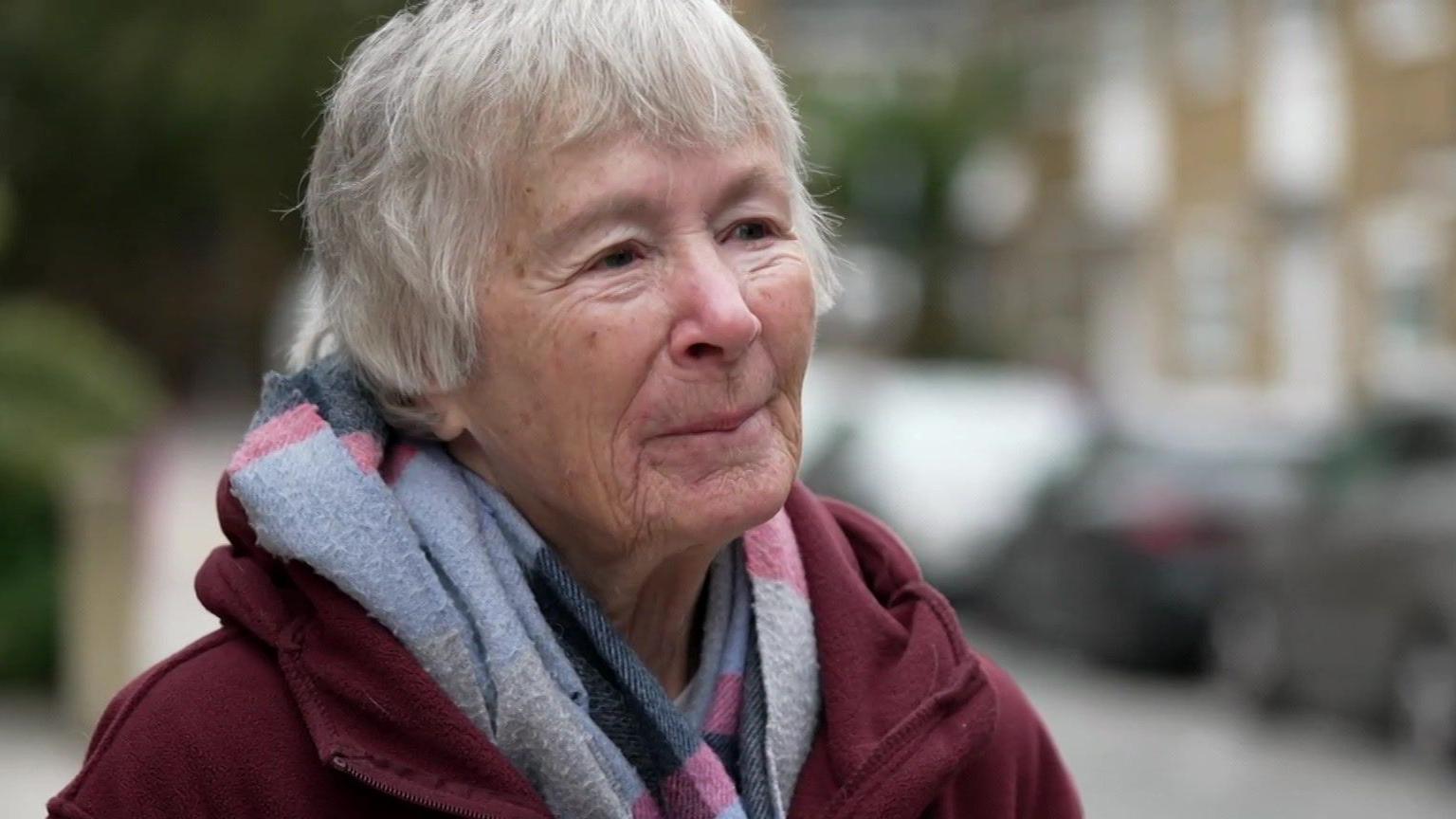'Tough love': Can council drugs squad tackle antisocial behaviour?

Tower Hamlets council enforcement officer John Fish leads the new drugs squad team
- Published
It's seven o'clock in the morning in Whitechapel, east London, and even before the market stalls are open, council enforcement officer John Fish is searching the streets for people taking drugs.
"You haven't had any in there this morning, have you?" he asks a shop-worker, who's emerging from an alleyway with a delivery.
"One of the constant challenges is the ingenuity of drug dealers," Mr Fish explains. "They'll find safe havens out of the way of CCTV. They'll encourage other people, who are on treatment, back into their world."
He's leading a team of seven officers, solely focused on tackling drugs and antisocial behaviour, which Tower Hamlets Council believes is the first of its kind.

The Tower Hamlets drug squad say they offer a choice of support for drug addiction - or prosecution, if offenders refuse
Instead of patrolling hot-spot areas, the team has identified 50 individuals who they suspect are causing the most harm in the community through drug use, and then builds up a profile of their behaviour.
"Where do they sleep? Who do they interact with? Where are they committing crime - if they're committing crime - and who are the victims?"
Mr Fish says they then look closely at the needs of that individual, and give them a choice, what he calls "tough love": agree to enter a treatment programme, hopefully get access to housing, or face prosecution if they continue to offend.
The team can issue written warnings, which can result in fines or prosecution if they don't comply, and provide intelligence to police, including from body-worn camera footage, so officers can make arrests.
This morning's patrol takes them to the area around the Whitechapel Mission, where staff and volunteers are preparing to serve up more than 400 free breakfasts, mostly to people who are sleeping rough or struggling with insecure housing.
Director Tony Miller tells me about half of them will be "carrying the baggage" of alcohol or drug addictions, including some who have "lost control".
"Their only thought is: 'Where is my next hit coming from?' Their behaviour can be antisocial, so they can be looking at theft from shops or individuals to try to feed their habit.
"Some will have fallen off the wagon and we will warn them about their conduct, offer them support and help them make better life choices," Mr Fish explains.
"Members of the public should see this as an ordinary street in London. They do not need to see people cleaning crack pipes, taking drugs and becoming unconscious through substance abuse."

Director of the Whitechapel Mission Tony Miller welcomes the drugs squad's approach of offering support ahead of enforcement
He says he's also looking out for those who've come to prey on the vulnerable who are trying to kick their habit, drug dealers and men hoping to sexually exploit women.
In his pocket, he says, are a number of written warnings for individuals who have been spotted on CCTV taking drugs.
"Surprisingly, a lot of them are not resentful, they're actually thankful. They want boundaries. They know they're damaging their health, they're really miserable most of the time," he says.
"If someone taps you on the shoulder and says, 'Do you want to take drugs?', it's really helpful to say, 'I can't mate, I've got an injunction, I'll get nicked if I do.'"
Mission director Tony Miller says he's found the drugs squad to be "very good" so far.
"I think it's very easy, instead of trying to fix problems, we move the problem out of sight.
"They are offering them rehab first, not just once or twice, but multiple times. It's only when they are refusing to take any responsibility, they say, 'guys you can't be doing this'."
The council created the drugs squad over the summer, at a cost of half a million pounds a year, in response to concerns from residents.
The cabinet member for safer communities, Abu Chowdhury, said pressures on police budgets meant the local authority felt it needed to "step up".
"As police are busy dealing with serious organised crime, sadly drug-linked antisocial behaviour isn't always the focus, and that's mainly because of resources," he explains.
"Residents are telling us this is one of their main issues. So something had to be done."

Councillor Abu Chowdhury says Tower Hamlets is responding to concerns raised by residents over antisocial behaviour linked to drug use
Last month it was revealed that the Metropolitan Police plans to redeploy officers across London dedicated to tackling antisocial behaviour to neighbourhood policing teams.
The Met said it was committed to "continuing its crackdown on antisocial behaviour in local communities", but critics warned that the officers' specialist knowledge and experience with serial drug users would be lost.
It comes after the force announced plans aimed at addressing a £260m budget shortfall, including cuts to police station front counters, and disbanding the Royal Parks police.
Tower Hamlets Council insists its drugs squad works in partnership with the Met, but is it a concern that specialist police teams are being lost?
"I think we have to work differently," the council's community safety director Dal Babu tells me. He's a former Met chief superintendent and says his experience shows "the police can't do it alone".
"They're focusing, as we'd expect, on the criminals, the people dealing drugs, the organised criminal networks."
He says the drugs squad is a new "trauma-informed approach" to tackling antisocial behaviour issues.
Is it a concern for Mr Fish - who himself served as a police officer for 30 years - that, without the powers of arrest, he can't be as effective?
"I can still patrol, I've got my body-worn video on, I'm not going to be taken away to manage a protest in central London," he tells me.
"In fact, with me not being police, not arresting people, it probably allows us to build closer bonds with people that - whilst they're offenders - are also themselves vulnerable and in need of help."
Those relationships, he says are important, because it helps them understand what support people need, but also means those individuals know they are being watched and authorities know who they are.
During his patrols, he stops frequently to chat to people, asking how they are and whether they need any help.
One man tells him wearily how he is sleeping rough, and is struggling to get any housing. He says he is "not in a good place".
Another shows him a piece of paper, with an appointment he's made to get treatment.
"You know if you don't keep this appointment I'm going to come and find you and take you there myself," Mr Fish smiles, as the man reassures him he will attend.
'It's a disease'
But tackling the complex issues around drugs and antisocial behaviour will clearly be challenging.
Residents have complained, in particular, about the use of nitrous oxide, otherwise known as laughing gas, reporting feeling intimidated by groups of people taking it, and the litter of small metal canisters left behind.
"What we see is a lot of antisocial behaviour, a lot of people out of work, drug-taking, people running around after drugs, and our big frustration is nothing seems to happen," says Sister Christine Frost.
Sister Christine, a Roman Catholic nun who has lived in the area for over 40 years and won an MBE for her community work, tells me how one of her neighbours regularly sees drug-dealing at her block of flats.
"The other day, she saw five young people using drugs on the grass in front of her building. She rang 101 and nothing happened, and she felt that nothing had even been recorded."
She welcomes the council investing in the drugs squad, but says there needs to be more information on how to hold them to account if the problem continues.

Sister Christine Frost says residents need to know who to hold to account if drug-linked antisocial behaviour is not tackled
She also believes there are wider societal problems that need to be addressed, including more training and employment opportunities for young people.
"I'm living across the road from Canary Wharf and I'm thinking, how many of our young people are working there?"
She says some aspire to sell drugs, because it seems the only route available to owning an expensive car.
"It's our young people who are ruining their lives. It's a disease. It's something killing us, but we can't live without it."
Since the launch of the scheme in June, the council says it has reported 11 suspected drug dealers, resulting in 10 arrests, and seized £50,000 of Class B drugs from an abandoned vehicle in a car park.
Of the 50 individuals it has targeted, 15 are engaging with substance misuse services, nine are in prison and five have been issued with Criminal Behaviour Orders, which set various conditions after a conviction.
It's still too early to assess the long-term impact, although Mr Fish is encouraged by what he's seen so far.
"There's one guy, I've never seen him sober before, he's been sober for six weeks, he's got family support, he's talking about getting a job in Lancashire, put on about a stone and half in weight. It's just fantastic."
As we are filming, another man approaches to tell Mr Fish that he's just been offered a flat and to say thank you.
"These guys really helped me, they even helped me while I was in prison, that's what I really needed," he says.
"You've made my day," Mr Fish congratulates him. "Stay on the script, yeah?"
Listen to the best of BBC Radio London on Sounds and follow BBC London on Facebook, external, X, external and Instagram, external. Send your story ideas to hello.bbclondon@bbc.co.uk, external